Software Engineer Performance Review Examples

Performance reviews play a crucial role in software engineers’ growth and development. These reviews provide an opportunity for managers and team members to assess an engineer’s skills, performance, and contributions to the team.
By conducting regular performance reviews, companies can set goals, monitor progress, and provide feedback that helps engineers enhance their abilities and achieve their full potential.
Quick navigation
What is a Software Engineer Performance Review?
A software engineer performance review is a critical process that evaluates an engineer’s skills, performance, and contributions to the team. This review provides a structured opportunity for managers and team members to assess an engineer’s strengths and areas for improvement. By setting clear goals and providing specific feedback, performance reviews help software engineers enhance their abilities and achieve their full potential. These reviews are not just about evaluating past performance but also about recognizing achievements and discussing professional development. A well-structured performance review ensures that software engineers receive the recognition they deserve and have a clear path for future growth.
The Importance of Performance Reviews
Performance reviews are an integral part of software development. They serve as valuable tools for both managers and engineers to evaluate and improve performance.
Managers can recognize achievements, identify areas for improvement, and align individual goals with organizational objectives.
On the other hand, for software engineers, performance reviews offer insights into their strengths and weaknesses.
Incorporating specific positive feedback during these reviews can enhance employee confidence and demonstrate appreciation for their work.
They guide professional development and provide a platform for open communication with their superiors.
The Role of Performance Reviews in Software Engineering
Performance reviews in software engineering serve multiple purposes:
1. They provide an opportunity for managers and engineers to reflect on past performance and set new goals for the future
By reviewing an engineer’s accomplishments, challenges faced, and areas of improvement, project managers can provide targeted feedback and suggest strategies to enhance the team’s performance. In face-to-face performance reviews, body language and facial expressions play a crucial role in conveying nuances and ensuring clear communication.
2. Performance reviews help identify training and learning opportunities
By assessing an engineer’s skill set, managers can identify areas where further training may be beneficial. This enables engineers to stay up-to-date with the latest technologies and best practices, enhancing their overall effectiveness in their roles.
3. Performance reviews contribute to employee engagement and retention
When engineers feel valued and receive constructive feedback, they are more likely to be motivated, productive, and satisfied with their work.
Positive performance review experiences can boost morale, increase job satisfaction, and foster a culture of continuous improvement within the software engineering team.
Key Elements of an Effective Performance Review

An effective software engineering performance review encompasses several key elements that contribute to a comprehensive evaluation. Here’s what you need to evaluate:
1. Technical knowledge and skills
Assessing an engineer’s technical abilities is crucial to determining their strengths and areas for improvement.
This includes evaluating their proficiency in programming languages, software development methodologies, and familiarity with industry-standard tools and frameworks.
2. Problem-solving abilities
Software engineers often face complex challenges that require innovative solutions.
Evaluating an engineer’s critical thinking, ability to analyze and debug code, and approach to troubleshooting help identify their critical thinking abilities and capacity to deliver effective solutions.
3. Teamwork and collaboration skills
Software engineering is a collaborative field, requiring effective teamwork and communication.
Assessing an engineer’s ability to collaborate, contribute to team efforts, and communicate technical concepts allows managers to gauge their effectiveness as team members.
4. Adaptability & stress-resistance
An effective performance review should also consider an engineer’s adaptability to change and ability to handle pressure. In the world of software engineering, adapting to new technologies, methodologies, and project requirements is crucial for success.
Additionally, the ability to handle pressure and meet deadlines is essential in ensuring the timely delivery of high-quality software products.
5. Leadership skills
Another important aspect to consider in performance reviews is engineer leadership potential. While not all software engineers aspire to become managers, identifying individuals with leadership qualities can be beneficial for future team growth and succession planning.
Evaluating an engineer’s ability to take initiative, mentor junior team members, and provide guidance demonstrates their potential to take on leadership roles in the future.
6. Contribution beyond technical expertise
An effective performance review should take into account an engineer’s contributions to the organization beyond their technical expertise.
This includes their involvement in professional development activities, knowledge-sharing initiatives, and contributions to the software engineering community. Recognizing and appreciating an engineer’s efforts in these areas can foster a sense of pride and encourage continued engagement.
A comprehensive performance review should provide opportunities for engineers to provide feedback on their managers and the overall work environment.
This two-way communication allows for a more holistic evaluation and helps identify areas where improvements can be made to enhance employee satisfaction and developer productivity.
You may also like: Must-Have Software Engineer Soft Skills
Setting the Stage for a Performance Review
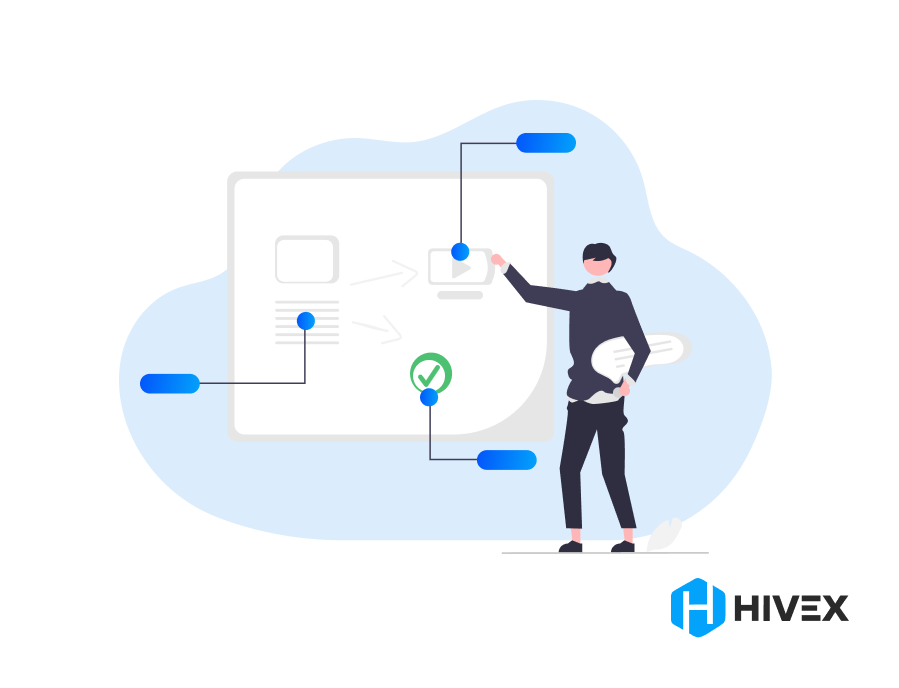
Setting clear expectations and criteria is essential for a fair and effective performance review. This involves establishing well-defined competencies and performance levels for software engineers, which should be explicitly defined by the company. Managers play a crucial role in this process by ensuring that these expectations are communicated clearly and consistently. By doing so, performance reviews become a tool for building trust and motivating engineers. Clear criteria help engineers understand what is expected of them and provide a benchmark against which their performance can be measured. This transparency fosters a sense of fairness and encourages continuous improvement.
Preparing for the Review: Tips for Managers
Managers play a key role in conducting performance reviews. They should approach this process with careful planning and preparation to ensure fairness and effectiveness.
Here are some key steps managers should follow:
- Review the engineer’s goals, objectives, and performance metrics from the previous review period
This step is essential to provide a comprehensive evaluation of the engineer’s progress and growth. - Gather feedback from the engineer’s peers, colleagues, and other stakeholders
Seeking input from various sources ensures a well-rounded perspective and provides valuable insights into engineer performance. - Prepare specific examples of the engineer’s achievements, challenges overcome, and areas for improvement
Concrete examples help provide constructive feedback and facilitate a meaningful discussion during the review. - Consider the engineer’s career aspirations and professional development goals
Understanding their ambitions will enable managers to provide guidance and support in aligning their objectives with the organization’s goals. - Establish an open and supportive environment for the review
Encourage honest and transparent communication, allowing engineers to express their thoughts, concerns, and aspirations.
What Software Engineers Should Expect
Software engineers should actively participate in the performance review process to make the most of this opportunity.
By following these guidelines, they can ensure a productive and meaningful review:
- Reflect on their accomplishments, challenges faced, and areas for growth
Self-assessing allows engineers to have a clear understanding of their strengths and weaknesses, enabling them to set realistic goals for improvement. - Prepare examples that highlight their key contributions to projects, successful implementations, and solution-finding abilities
Providing concrete evidence of their achievements helps showcase their value and impact within the organization. - Identify areas where they would like to receive feedback or support from their managers
By proactively expressing their needs and clear expectations, engineers can ensure that the review addresses their concerns and helps them progress in their careers. - Consider the feedback received during the review as an opportunity for growth
Embrace constructive criticism and use it as a catalyst for personal and professional development. - Discuss career aspirations and professional development goals with their managers
By sharing their long-term objectives, engineers can work collaboratively with their team leaders to create a roadmap for achieving their ambitions.
Remember, a performance review is not just a formality but a valuable way to foster growth, enhance communication, and strengthen the working relationship between managers and software engineers.
By approaching the review process with diligence and open-mindedness, both parties can contribute to a more productive and fulfilling work environment.
Components of a Software Engineer Performance Review
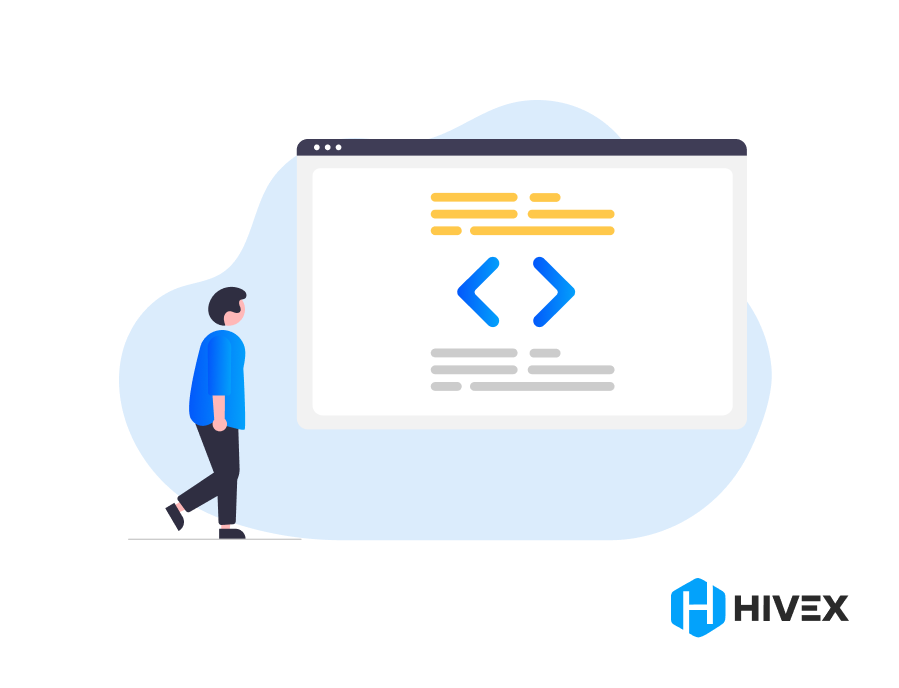
A comprehensive performance review for software engineers consists of various components, each evaluating different aspects of their performance.
Evaluating technical skills and knowledge
Assessing an engineer’s technical skills and knowledge provides insights into their abilities to perform their core responsibilities effectively.
Engineering managers can evaluate this through:
- code reviews
- examination of project outcomes
- discussions around technical challenges encountered and overcome
During the performance review, team leaders can delve deeper into the engineer’s technical expertise by discussing specific projects or tasks that require advanced technical competence.
They can inquire about the engineer’s familiarity with different programming languages, frameworks, and tools.
Additionally, managers can explore the engineer’s understanding of software development methodologies, such as Agile or Waterfall, and their ability to apply them effectively in their work.
Assessing problem-solving abilities
Problem-solving is integral to a software engineer’s role.
During a performance review, supervisors should assess an engineer’s approach to logical reasoning, their ability to think critically, and their capacity to generate innovative solutions.
They should discuss specific instances where the engineer resolved issues successfully, highlighting achievements and areas of excellence.
A good practice is to inquire about engineer’s approaches to solving problems, such as their ability to break down complex problems into smaller, manageable tasks. It’s also useful to discuss the engineer’s creativity in finding unique solutions and ability to adapt to changing circumstances.
Furthermore, managers should assess the engineer’s efficiency in troubleshooting and debugging, showcasing their real-time problem-solving skills.
Reviewing teamwork and collaboration skills
In most companies, software engineers often work collaboratively in cross-functional teams, so it’s important to evaluate teamwork and collaboration skills.
This allows managers to assess an engineer’s ability to communicate effectively, contribute to team efforts, and resolve conflicts constructively. Feedback from peers and colleagues can also provide insights into an engineer’s collaboration capabilities.
During the performance review, supervisors can discuss the engineer’s role within the team and their level of engagement in collaborative projects. They should inquire about the engineer’s communication skills (both written and verbal) and their ability to articulate complex technical concepts to non-technical team members.
Additionally, it is also helpful to explore the engineer’s ability to adapt to different team dynamics and willingness to take on leadership roles when necessary.
Last but not least, managers can discuss specific instances where the engineer demonstrated exceptional teamwork and collaboration skills.
For example, successfully leading a team project or resolving conflicts within the team. This allows for a comprehensive evaluation of the engineer’s ability to work effectively in a team environment.
Delivering the Performance Review

Delivering a performance review effectively requires tact, empathy, and constructive feedback. It is a crucial process that helps managers and employees align their expectations, set goals, and identify areas for improvement.
In face-to-face performance reviews, body language plays a vital role in conveying empathy and understanding, ensuring that nuances are not lost and reducing the risk of misunderstandings.
By providing valuable feedback, engineering managers can motivate and empower their team members to reach their full potential.
Best practices for constructive feedback
When providing feedback during a performance review, managers should:
- Emphasize strengths and successes before addressing areas for improvement
Recognizing and appreciating employee achievements fosters a positive and supportive atmosphere. - Use specific examples to back up feedback, making it clear and actionable
By illustrating instances where an employee excelled or faced challenges, managers can help them understand the impact of their actions. - Deliver feedback respectfully and non-confrontationally, focusing on behaviors and actions rather than personal traits
By separating the individual from their performance, managers can foster a growth mindset and encourage continuous improvement.
Constructive feedback is indeed a powerful tool to inspire professional growth and development.
When delivered effectively, it helps employees identify their strengths, address areas for improvement, and enhance their overall performance.
Handling difficult conversations during reviews
We’re getting to the hard part now. During a performance review, managers may need to address areas for improvement. These conversations can be challenging, as they require to provide constructive criticism while maintaining a supportive and empathetic approach.
It is crucial to address both positive and negative feedback during these difficult conversations to foster growth and improvement.
To handle these conversations effectively, managers should:
- Be empathetic
Discussing areas for improvement can be hard for engineers. By showing empathy and compassion, supervisors can create a safe space for open dialogue and encourage the employees to share their thoughts and concerns.
- Recognize the engineer’s efforts and accomplishments, highlighting their growth potential
By recognizing their progress and achievements, supervisors motivate them to keep developing and overcoming challenges.
- Provide guidance and resources for improvement, such as training opportunities or mentoring
By offering support and actionable solutions, managers can help employees bridge the gap between their current performance and desired goals.
Difficult conversations are an opportunity for growth and learning. When handled with care and consideration, they can foster trust, strengthen relationships, and pave the way for future success.
Post-Review Actions and Follow-ups
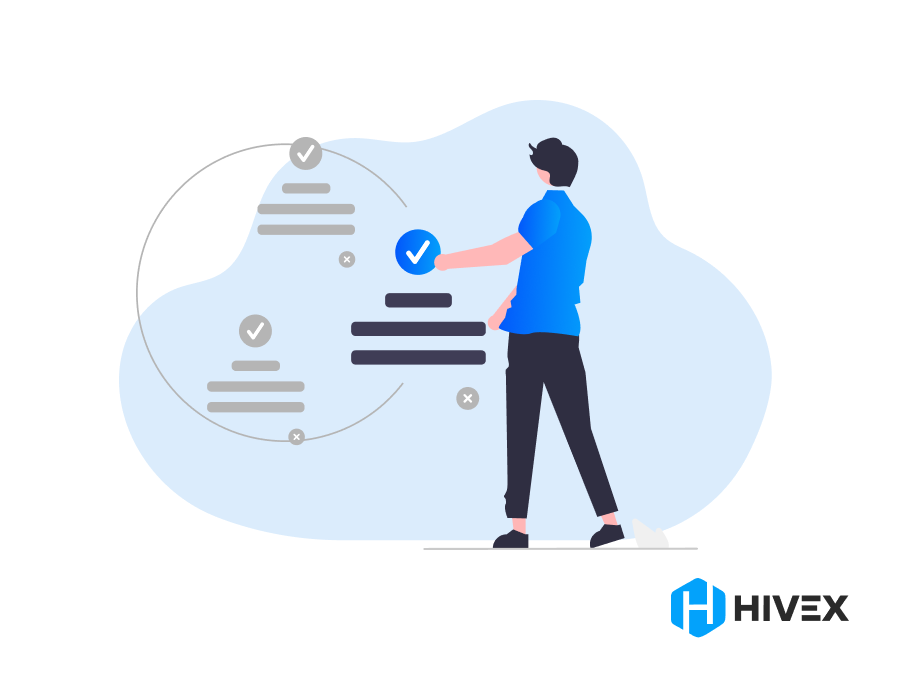
Post-review actions are crucial for driving continuous improvement and ensuring progress after the performance review.
Upon completing it, managers and engineers need to take proactive steps to enhance performance and foster growth. By implementing the following post-review actions, organizations can create a continuous improvement culture.
Setting goals for future performance
One of the key post-review actions is setting future performance goals. This step involves collaboration between managers and engineers to establish clear, specific, and measurable objectives that align with the organization’s overall objectives.
These goals should also take into account the engineer’s aspirations and areas for growth identified during the review.
By setting goals, both parties can work together to create a roadmap for success. This process allows engineers to have a clear understanding of what is expected of them and provides them with a sense of direction.
It also enables managers to monitor progress and provide appropriate support and guidance along the way.
Improving Communication
Effective communication is the cornerstone of successful performance reviews. Managers should strive to be specific, objective, and focused on behavior rather than personality when providing feedback. Constructive feedback should aim to coach employees, helping them improve their work in the future. A two-way dialogue is essential for this process, as it allows for a more collaborative approach to feedback. Managers must actively listen to their team members, acknowledging their unique challenges and strengths. By fostering an environment of open communication, managers can provide feedback that is not only constructive but also empowering, helping engineers to capitalize on their strengths and address areas for improvement.
Monitoring progress and continuous feedback
Another key post-review action is ongoing progress monitoring and providing continuous feedback. Regular feedback, direct reports, and check-ins are essential for engineer development and growth.
Managers should schedule periodic discussions with their engineers to track progress, address any challenges, and provide additional support or guidance as needed.
This real-time feedback loop ensures engineers stay on track to achieving their goals and reinforces a culture of open dialogue within the organization.
During these check-ins, managers can offer constructive feedback to help engineers pinpoint areas for improvement and celebrate their successes. Remember, timely feedback allows engineers to make needed adjustments and continue their professional growth.
These conversations also give engineers a chance to share insights, concerns, and ideas. Such two-way communication encourages collaboration and helps managers understand individual needs and aspirations better.
By implementing post-review actions such as setting goals for future performance and monitoring progress through regular feedback, organizations can ensure that performance reviews are not just a one-time event but a catalyst for ongoing development and improvement.
Developers’ Performance Review Example
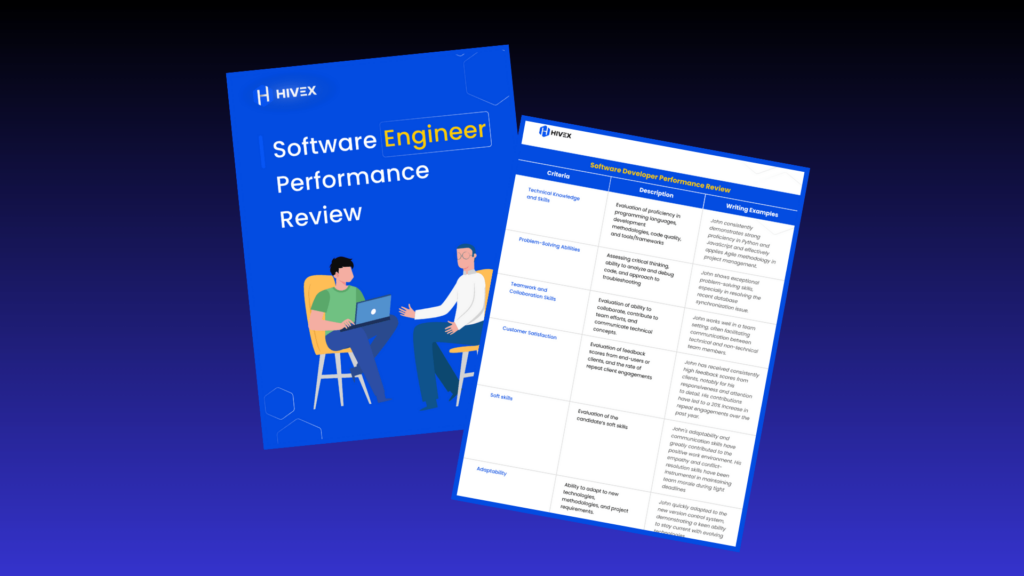
We’ve put everything you need in one place.
No more endless searching. No more stressful preparation.
Just a clear and straightforward template to make your performance reviews smooth and stress-free.
We’ve put all the essential elements into one easy-to-use resource.
And you can download it here for free.
Save time. Boost productivity. Ensure success.
Best Practices for Software Engineer Performance Reviews
Principles for Fair Performance Reviews
To write great performance reviews, managers should adhere to several key principles:
- Challenge Yourself: Continuously strive to improve at least one aspect of how you conduct performance reviews.
- Set Clear Goals and Expectations: Ensure that engineers know what is expected of them and what they need to achieve.
- Gather Feedback from Multiple Sources: Collect input from peers, colleagues, and other stakeholders to provide a well-rounded perspective.
- Avoid Assumptions and Biases: Base your evaluations on objective data and specific examples, avoiding any preconceived notions.
- Focus on Behavior and Performance, Not Personality: Provide feedback on actions and outcomes rather than personal traits.
By following these principles, managers can ensure that performance reviews are fair, build trust, and motivate their team members. Additionally, managers should:
- Prepare Early: Start preparing for the review months in advance, or as soon as the employee joins the team.
- Collect Data: Gather information on the employee’s achievements and review their performance metrics.
- Seek Feedback: Obtain feedback from others who have worked closely with the engineer.
- Document the Review: Write the review in a separate document, including achievements, feedback on each area, and actionable suggestions for improvement.
- Deliver Thoughtfully: Conduct the review in a dedicated performance feedback and compensation meeting.
- Encourage Dialogue: Begin the meeting by setting expectations and making it clear that you want to have a two-way conversation.
By adhering to these best practices, managers can ensure that performance reviews are effective, fair, and beneficial for software engineers, ultimately fostering a culture of continuous improvement and professional growth.
The Impact of Regular Performance Reviews
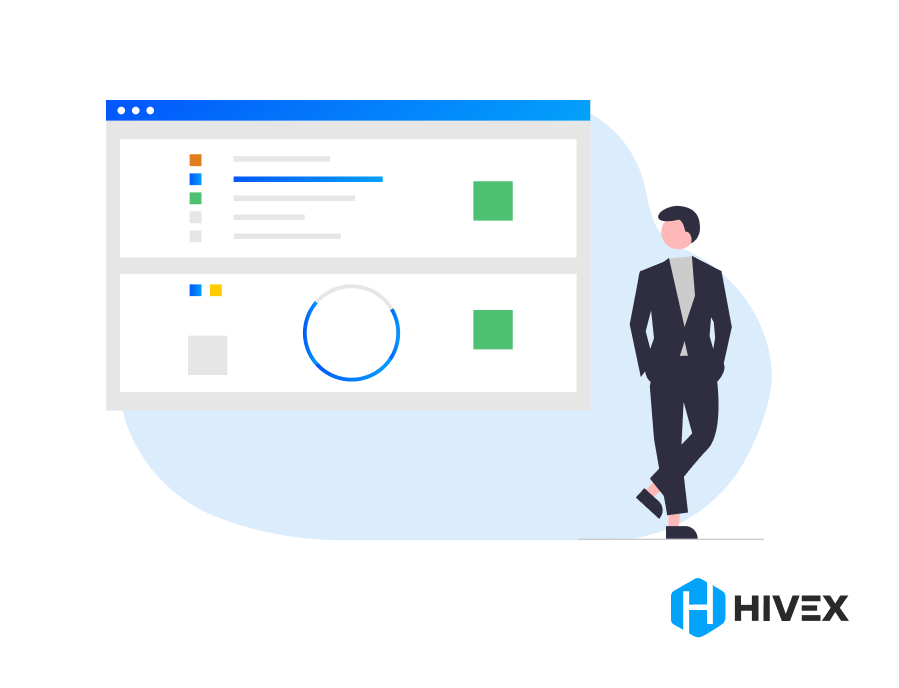
Regular performance reviews can have a significant positive impact on software engineers and their organizations. Providing specific positive feedback during these reviews is crucial for boosting employee morale and job satisfaction. Let’s take a closer look at some of the key benefits:
Boosting employee morale and job satisfaction
When engineers receive recognition for their achievements and have the opportunity to discuss their professional development, it boosts their morale and job satisfaction. Positive feedback is crucial in this context as it enhances employee confidence and demonstrates appreciation for their work. Feeling valued and supported motivates them to excel in their roles and enhances overall team dynamics.
For example, imagine a software developer named Sarah who has been working diligently on a complex project for several months.
During her performance review meeting, her manager acknowledged her hard work and the positive impact it had on the team. This recognition not only boosts Sarah’s morale but also reinforces her commitment to delivering high-quality work.
Performance reviews provide a platform for engineers to express their career aspirations and discuss potential growth opportunities within the organization. This open dialogue fosters a sense of empowerment and engagement, as engineers feel that their professional development is taken seriously.
Driving continuous improvement and growth
Performance reviews facilitate continuous improvement by identifying areas for skill development and setting goals for professional growth.
By providing specific feedback and guidance, managers can empower engineers to enhance their strengths and address weaknesses, resulting in increased productivity, innovation, and overall team performance.
For instance, let’s consider a software engineer named John who recently received feedback during his performance review that he could improve his communication skills.
Armed with this knowledge, John actively seeks out opportunities to attend workshops and training sessions focused on effective communication.
Over time, his improved communication skills not only benefit his work but also positively impact the team’s collaboration and productivity.
Performance evaluations provide a structured framework for managers and engineers to discuss career goals and create development plans. By aligning individual aspirations with organizational objectives, great performance reviews become a catalyst for growth and progress.
The bottom line
Software developer performance reviews are valuable tools that promote growth, development, and enhanced job satisfaction.
By effectively conducting them, managers can provide constructive feedback, set clear goals, and foster continuous improvement within their engineering teams.
Regular reviews, when approached with thorough preparation, empathy, and a focus on collaboration, have the potential to yield significant long-term benefits for both engineers and their organizations.
Read also: How much do software developers earn?


